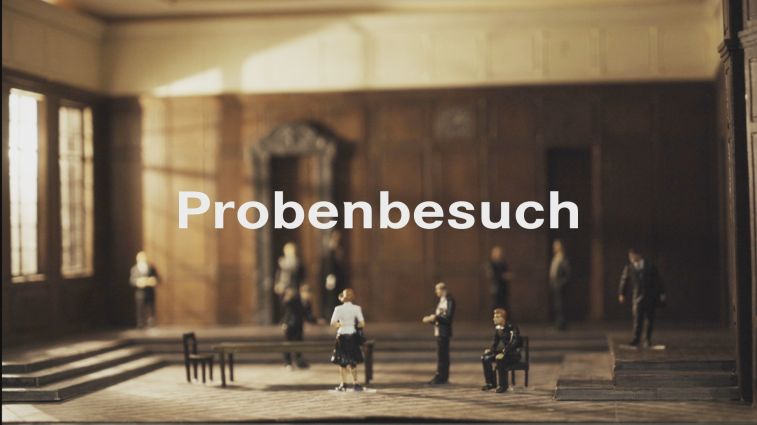Im Bann des Eros der menschlichen Stimme - Deutsche Oper Berlin
Dramaturg Dorothea Hartmann spoke with director Christof Loy.
In thrall to Eros in the human voice
After a break lasting over 90 years, Christof Loy brings a new production of Korngold’s “Heliane’s Miracle” to the Bismarckstraße venue
“Heliane’s Miracle” was taken up by 12 stages in the German-speaking area immediately following its world premiere in 1927. Yet a few years later the opera had vanished from programmes and slipped from public memory – right up until today, that is. What happened?
Christof Loy: The main reason was that the Nazi regime had slapped a ban on Korngold and all other Jewish composers, preventing them from working. The prohibition also affected the biggest work rivalling Korngold’s piece at the time – Ernst Krenek’s “Jonny spielt auf”, a work that was much more of a hit with audiences than “Heliane”. And with moves afoot after World War II to rehabilitate the composers of so-called “degenerate music”, Korngold had a hard time of it. If you ask me, there was a lack of appreciation of the mystical level and the religiosity of the work. Early in the opera you already have the spheric sounds of the prelude heralding a godhead-based universe. Disillusioned post-war society was perhaps unable and unwilling to grapple with these difficult themes.
You proposed this work to the Deutsche Oper Berlin, a work that hasn’t been performed for decades. Is this the right time?
Loy: I don’t find works that deal with God so difficult. I believe in an element or being that establishes order. And I think it’s worth our while to seek out such a figure. And yes, maybe it is right for the times we live in, when people are hankering for spirituality and religiosity.
And is Berlin the right place?
Loy: You need a stage and an auditorium of a certain size to accommodate Korngold’s huge score and the full impact of the music. And it makes sense to be putting on the opera here because of the Deutsche Oper’s specific history of works mounted: “Heliane” actually had three premieres in 1927/28 – first in Hamburg, then in Vienna, then at the Städtische Oper Berlin, today’s Deutsche Oper. And in Berlin, an oft prosaic and unpolished city today, maybe it’s interesting to ponder on issues like “love”, “loving thy neighbour” and “com-passion”.
At first glance “Heliane’s Miracle” appears to be a straightforward love triangle. In the middle we have Heliane, the wife of a ruler who is incapable of love. And then we have a nameless “outsider” on whom Heliane bestows her love. What is it about the story that catches your interest?
Loy: The most obvious conflict has to do with a man, in this case the despot, not being able to deal with the fact that his wife has broken her vows. Ok, we can relate to that. But when Heliane defends her love for the stranger in the full glare of publicity, she’s crossing a Rubicon where traditional concepts of love, loyalty and sexuality are concerned. The work invites us to question the very core of our moral codes. Heliane herself is at a loss to explain the shift that has taken place within her. She has stripped bare in front of the stranger, so it totally looks like they’ve just had sex. But for Heliane it’s different: for her it was “love” on a number of levels. Love as a spiritual experience. Love as a Christian deed: you gift yourself to another person. Love as a sharing of the suffering of a condemned man. And love articulated in sensuality and the erotic. Heliane is fully aware that she is being called upon in court to plead guilty or not guilty. And she realises the inadequacy of our concepts of guilt, innocence and morality.
“Heliane’s Miracle” was written for the great singers of the 1920s. Lotte Lehmann sang the title role in Vienna. The parts are considered physically hard to sing. What challenges are you up against?
Loy: The singers have to be fully cognizant of what they are capable of, both in the forte region and in the subtleties of piano. These are very physically demanding roles. And at the same time they have to act the part in a convincing way, not let the dramatic performance get submerged in the effort required to sing it.
In 1927 critics were drawing attention to the “luxuriation of the singing” in this opera. Korngold was pushing the late-romantic style to its limits and again planting the singers’ voices at centre stage – at a time when most composers had stopped doing that.
Loy: In the parts of Heliane and the stranger there is a kind of sublimation of Eros going on by way of the singing. We are in the thrall of the eros of the human voice and shriven by the auditory experience. The singing in this opera has something narcotic about it. There is a growing yearning for it never to stop. At key moments of the opera – in Heliane’s aria or the closing duet between Heliane and the stranger – we’re all wishing for it to go on and on forever.





